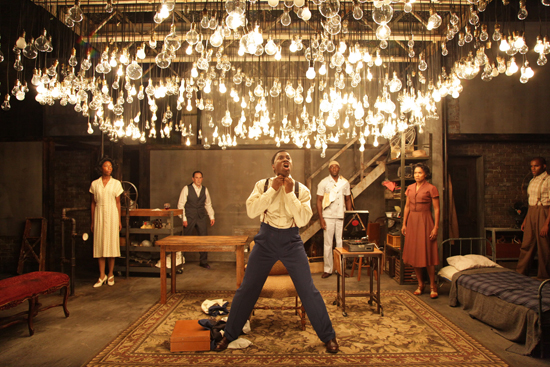Huntington’s Invisible Man a Tour de Force
Searing Ellison classic adapted for stage

Teagle F. Bougere (center) and members of the cast of Oren Jacoby’s adaptation of Ralph Ellison’s Invisible Man, at the Boston University Theatre through February 3. Photo by Astrid Reiken
“I am an invisible man.” The opening words of Ralph Ellison’s seminal novel of race, class, and the African American experience still resonate, 60 years after the first publication of a book the youthful Barack Obama carried around in his back pocket.
Boston audiences can see Ellison’s Invisible Man played out in a lavish theater adaptation that drew raves in modestly staged Chicago and Washington, D.C., productions before being brought to the BU Theatre by the Huntington Theatre Company.
“As a meditation on the intricacies of race and class in American culture, the novel Invisible Man has not been surpassed,” says Henry Louis Gates, Jr., Alphonse Fletcher University Professor at Harvard University.
“It’s a big novel with huge ideas,” says Huntington artistic director Peter DuBois, and audiences will experience “this visual feast, with a very vivid theatrical style.” The novelist died in 1994, at the age of 81; his novel’s adaption, by Academy Award–nominated screenwriter Oren Jacoby and Christopher McElroen, who also directs the play, has been authorized by the Ellison Trust. The searing tale, which chronicles its unnamed African American narrator’s epic journey from the Deep South to Harlem across a brutally divided 1930s America, is “unwieldy, mythic, and satisfying,” says Jacoby, a documentary filmmaker whose credits include The Irish in America segment Success for PBS, The Beatles Revolution, and the short film Sister Rose’s Passion, nominated for an Academy Award. “I think it’s one of those timeless tales that has a particular resonance today. The struggle to be part of the American success story is an ongoing struggle.” He says the three-act play’s migration from small houses to the 800-seat BU Theatre has made it possible to stage it as “a fabulous, big tour de force.”

The task of adapting Ellison’s classic to the stage while maintaining its integrity “turned out to be fairly straightforward,” says Jacoby, who scored the production with blues, spiritual, and gospel music from the 1930s and ’40s. “I followed one simple rule: all the words spoken in the play had to be Ellison’s. My adaptation was a process of editing and shaping those words into a somewhat simpler narrative with a three-act structure.”
In his Homeric journey, narrated in the book from a basement refuge, Ellison’s young protagonist faces bigotry, degradation, and betrayal. “Like the novel, the play is a series of intense confrontations,” says Jacoby. “One by one, Invisible Man must confront the antagonistic characters, as well as his own illusions, that have kept him from being true to himself.” Ellison was greatly influenced by Shakespeare, whose complete works resided on the novelist’s desk beside the dictionary, according to Jacoby, and like Hamlet, Ellison’s Invisible Man is “torn by conflicting impulses.”
Shakespeare figures prominently in the acting credits of Teagle F. Bougere, whose portrayal of Invisible Man in the Chicago and Washington, D.C., productions drew admiring reviews. Bougere’s Broadway credits include Asagai in A Raisin in the Sun and Caliban in The Tempest, with Patrick Stewart, directed by George C. Wolfe. His off-Broadway credits include Macbeth, Henry V, Timon of Athens, and Antony and Cleopatra, directed by Vanessa Redgrave, all with the New York Shakespeare Festival Public Theater, as well as A Soldier’s Play at Second Stage Theatre and A Fair Country at Lincoln Center Theater.

The Invisible Man adaptation, called “extraordinary and transporting” by the Washingtonian, features an ensemble cast that includes returning Huntington veterans Johnny Lee Davenport (Vengeance Is the Lord’s) and Jeremiah Kissel (Circle Mirror Transformation and The Cherry Orchard), as well as McKinley Belcher III, Brian D. Coats, De’Lon Grant, Edward James Hyland, Deidra LaWan Starnes, and Julia Watt.
Jacoby says he’s been “thrilled and surprised” by how many young people have told him that the play carries deep meaning for them. “I just think it’s one of the timeless tales that has particular resonance today,” he says.
Invisible Man runs at the BU Theatre, 264 Huntington Ave., Boston, through February 3, 2013. Tickets may be purchased online, by phone at 617-266-0800, or in person at the BU Theatre box office. Patrons 35 and younger may purchase $25 tickets (ID required) for any production, and there is a $5 discount for seniors. Military personnel can purchase tickets for $15, and student rush tickets are also available for $15. Members of the BU community get $10 off (ID required) and are also eligible for a special subscribers discount rate. Call 617-266-0800 for more information. Follow the Huntington Theatre Company on Twitter at @huntington.
Comments & Discussion
Boston University moderates comments to facilitate an informed, substantive, civil conversation. Abusive, profane, self-promotional, misleading, incoherent or off-topic comments will be rejected. Moderators are staffed during regular business hours (EST) and can only accept comments written in English. Statistics or facts must include a citation or a link to the citation.